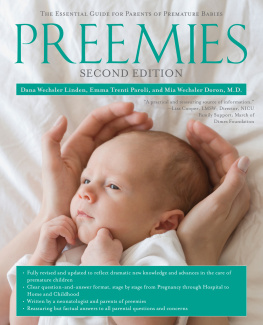

Published in 2004 by
Academy Chicago Publishers
363 West Erie Street
Chicago, Illinois 60610
2004 Jeff Stimpson
All rights reserved.
No part of this book may be reproduced in any form without the express written permission of the publisher.
Portions of this work have appeared in Ithaca Child, The Village Family Magazine, Abilities Magazine (Toronto), and Laughing and Learning: Adventures in Parenting, among others, as well as on the following Web sites: Cold Glass, Early Edition, Fatherville, Mensight, Premature Baby Premature Child, Sevenseasmagazine.com, Storknet, and Whims Place, among others.
Printed in the U.S.A.
Library of Congress Cataloging-in-Publication Data to come
For Jill
CONTENTS
JUNE TO OCTOBER, 1998
S OMEBODY YELLS B OY ! Everything I used to want turns to mist when someone sails past with a baseball. Later I learn its his head. I think its gray. I peek on tiptoes as a clot of doctors dive onto the Boy!, and beyond their gowns I glimpse hands and feet the size of a GI Joes. So small, I whisper. So small it kicks my chest. They slide him into a clear plastic box, and wheel him away.
Our road to parenthood had already been twisty. My wife Jill and I were living in Baltimore in early 1997, trying to conceive a baby. When that didnt work, we headed to doctors, who gave us appointments, exams, and odd things to do in cups until one evening in December we heard the nurse on the phone say, Jill, your test is positive! So we quit our jobs at suburban Maryland newspapers and wheeled it back to the New York City, where Jill is from. In the months since, wed been pinballing from sonogram to sonogram to let doctors probe Jill as if hunting for a submarine. They said the baby was small, small, small.
They can tell a fair amount about a fetus just by looking at the sonogram: what it sort of looks like; how big it is; if its moving the right way; if its making the pre-breathing movements. Alex seemed okay for most of those things, but he was way behind in growth, which we discovered when Jill went in for a routine sonogram at around twenty weeks and was told that Alex was roughly a seventeen-week size.
Around this time, one of the doctors had begun to sigh a lot, and started to use the word miracle in a bad way, and not long after that four new letters landed in our lives: IUGR, or intrauterine growth retardation. Alex didnt just arrive prematurely: They chose to deliver him early, thinking that he would do better outside the womb than inside. Jill had also been given steroid shots to develop his lungs for this early deliverythough, in the time since, research has shown that steroids dont help in these cases.
The doctors were dating growth from before conception, which made no sense to me. But as our submarine dropped further down a percentile chart of fetal growth, the doctors began wondering when intensive care might be best. Lets just hope you make it to twenty-eight weeks, the doctor sighed. Then twenty-nine weeks. Then thirty As the numbers climbed, the doctors hands waved and waved in wider and wider circles, and she felt compelled to add that shed be praying for us. They continued to monitor the fetus with, eventually, daily and detailed sonograms, measuring it and looking for specific signs of movement and particular behaviors, such as joints flexing, and pre-breathing movementsentering Alex in the first critical race of his life: develop, or come out.
Jill went on bed rest, sentenced to rented movies and my cooking. She rose only for sonogram appointments, which jumped from once a week to twice a week to once a day, which pretty much killed time until she was ordered into the hospital after a technician seemed at sea one day during a biophysical (the detailed sonogram), and the doctor didnt see the signs from the fetus she wanted to see immediately. In the years ahead, Jill would say that if she had it to do over again, shed insist that the doctor wait half an hour, let her eat something, and try it all again. But a pregnant woman is rarely in a position to fight off panic and battle a doctor.
So we came to that Sunday, when Jill gave me the news and I said, Okay. I just hope the kid isnt too shocked, she added, looking out the window, her hand on her belly where the kicks continued.
Premature labor affects a fifth of pregnancies in the U.S., and annually some 400,000 premature infantspreemiesare born in the country before the thirty-seventh week of pregnancy. The trickiness of predicting the outcomes for such fetuses has been documented. My family was looking at two and a half months early.
Tick tick tick went the heart monitor in the OR as I tied on my papery surgical mask and wondered how life was about to change. Wondered how I was going to screw up this kid. Wondered if Id get the chance to screw him up. There was nothing to do but stroke Jills head, listen to the surgeons chatter and remember the comforting words of The Neonatal Intensive Care Unit Parent Information Booklet, a hospital handout that begins with the observation, We know this can be a very stressful time.
The Neonatal Intensive Care Unit, or NICU (nick-YOU) looks like a baby hatchery: it has a clean, gluey smell and is crammed with carts and medical gear and clear plastic boxes called isolettes. Inside the isolettes, most of the arms and legs dont move; their owners seem pretty tired. Cries are muffledone infant sounds like a crowbut red and green numbers on monitors constantly set off alarms, bleeps and bells that shatter any sense of a homey nursery. Jill has told me preemies can hear, and some parents fill a few cassettes with recordings of the NICU to play for their baby when it comes home.
In a premature infant, the lungs, digestive and circulatory systems are undeveloped. Preemies most common health problems affect breathing, heart, brain, body heat and eyesthe latter problem may result in permanent blindness (Steve Wonder was a preemie). Premature babies are at increased risk for apnea, in which breathing temporarily stops for twenty seconds or more. Maybe a lot more.
Someone has stuck a piece of white tape across the front of my sons isolette and written Hi! Im Alexander! No other baby has a piece of tape. Tubes run into Alexs isolette. Blue tubes, green tubes, clear tubes, fat tubes, fine tubes. One carries in warm, humid air; another runs into his pinhole left nostril, and a wider clear tube goes down his throat. He opens his mouth wide, but no sound comes out because the clear tube is between his vocal cords. My kid is painstakingly crafted with miniature versions of my feet and with knuckles the size of these letters. My finger is monstrous in his hand. His eyes are closed, wrinkles rippling across his forehead just as they did on the forehead of my father, who also had thin hair. Alex has my nose. I open the porthole of the isolette and peer in. I look at his palm; his lifeline is long.
He is one tough little kid, his doctor tells me, then reiterates all that may yet go wrong. As recently as the 1980s, doctors were brutal with the parents of preemies, standing over isolettes and spewing predictions of everything from a quick death in infancy to a bad social life in grade school. Dont touch them, theyd say, dont bug them; their nervous systems arent formed, and the case is kind of hopeless anyway. These days the medical profession has wised up a littlesome nurses encourage holding, for instancebut nobody will predict anything more than a day, sometimes an hour, ahead.
Next page









